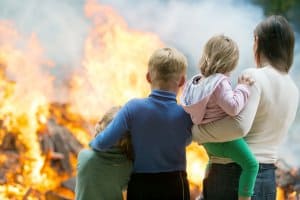Opinion: 5 things landlords should do to protect themselves from natural disasters

The truth is, even though the Camp Fire in the northern part of the state is now 100% contained, the challenges for local residents are just getting started.
Once the damages are tallied, there will be lives to rebuild, insurance payments to sort out and communities to re-establish.
And it’s not just homeowners who have to worry; this all goes for landlords as well. Indeed, the vast majority of rental properties in the U.S. are owned by do-it-yourself landlords, so it’s critical to be prepared for the worst.
Here are a few things that landlords should keep in mind to better protect their investment properties in the event of a catastrophe — be it fires, floods or hurricanes:
Know your coverages, before disaster strikes: The fact is, flood insurance is not part of most homeowners insurance policies, so most people — even landlords — don’t have it. They’ll have standard coverage and fire insurance, but that often isn’t enough in the case of a major catastrophe. Are you as a landlord covered in the event of a wildfire or hurricane at your property? It’s also important to maintain a photo archive of each of your properties — and keep it up-to-date — so you have documentation of what each space looks like before disaster strikes.
Beware of scams: Natural disasters often bring scam artists out of the woodwork. Many people are rebuilding at the same time, often with insurance money, and they sometimes aren’t as careful with vetting their providers as they should be. Landlords, in particular, need to be careful with those they contract with to do any needed repairs, especially when working with those they aren’t familiar with. Scams such as taking the money and never doing the work, or submitting bids that are twice as much as normal, are, unfortunately, far too common in these situations and off-site landlords can be easy targets, especially when they’re rushing to get properties fixed and back on the market quickly after catastrophic damage.
Keep your contractors on speed dial: That said, it pays to know those you’re working with. Most landlords already know the value of a good Rolodex. When it comes to fixing everyday issues for tenants and overseeing general maintenance, nothing beats having a good contractor or two on hand to get the job done in a timely manner. But, in the case of a natural disaster, often the best providers are overloaded with work. You don’t want to be caught out in the cold when you need their help the most.
Always push for renter’s insurance: Renter’s insurance should really be called “renter’s negligence insurance,” because that’s really what it covers. If the tenant leaves the faucet running, then the landlord is covered. But in the case of a natural disaster, things change. What’s going to happen to your asset? What’s going to happen to your tenant? The value of renter’s insurance in these situations is that at least your tenant can easily go out and find a new place to live while you work through the process of repairing your damaged asset. It’s a fairly inexpensive coverage that looks out for you both.
Keep your paperwork in order: Often in the case of a natural disaster, it’s not just your property that gets destroyed but your office as well. Where are you keeping your lease agreements? Where are your deeds and other legal documents? Do you have backups kept safely somewhere else if those originals are destroyed?
The fact is, a catastrophe on the scale of the Camp Fire is extremely disruptive to all involved. Landlords who own properties in areas that are likely to be impacted by such events would do well to prepare an action plan in advance — ensuring that tenants know how to contact you in the event of a disaster, what major damage means for their lease and more.
Because, for landlords, a natural disaster isn’t just a personal problem. It’s a major business disruption as well.
Source: marketwatch.com















 Accessibility
Accessibility